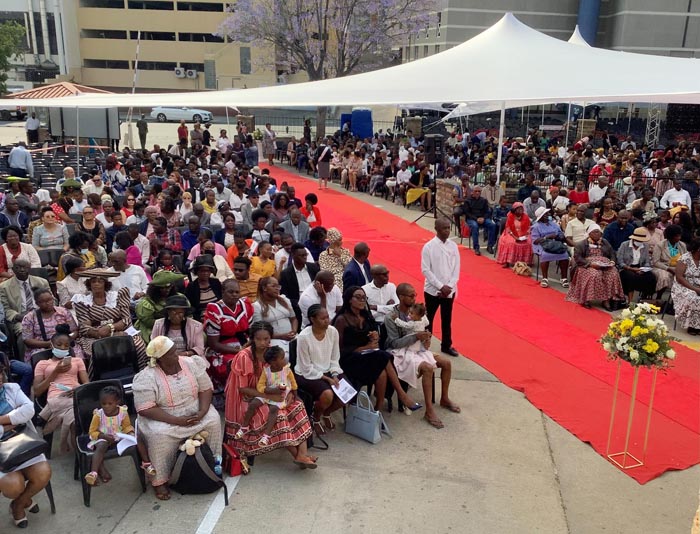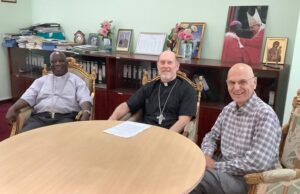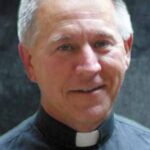
Bishop Thomas Zinkula participated in a Mass in Namibia during a trip to Africa last month.
By Barb Arland-Fye
The Catholic Messenger
Bishop Thomas Zinkula recently journeyed to sub-Saharan Africa to build relationships with his brother bishops and to witness the fruits of projects that strengthen the young, growing Catholic Church there. He met Catholics who embrace their faith with joy amidst daunting poverty and the challenging effects of climate change.
During his travels in Africa, the bishop was reminded and appreciative of the universality of the Catholic Church. He noted, “Although there were cultural, dietary, language and economic differences, I felt very much at home among the Catholics I encountered. We are grounded in the same faith tradition, which unifies us. Our Catholic faith is at the center of who we are. We celebrate the same sacraments and believe the same truths. Together, we are missionary disciples of Jesus Christ.”
He made the journey as a member of the Subcommittee on the Church in Africa of the U.S. Conference of Catholic Bishops, which operates the Solidarity Fund for the Church in Africa. Fritz Zuger, a subcommittee consultant, accompanied Bishop Zinkula to the Inter-Regional Meeting of the Bishops of Southern Africa (IMBISA) and then to Malawi to see a few of the funded projects and other benefits of the Solidarity Fund. The African bishops’ conferences submit proposals to the Solidarity Fund’s subcommittee for projects to build capacity of the fast-growing Catholic Church in Africa, Zuger said.
Networking with the bishops in Southern Africa also provided Bishop Zinkula with an appreciation for the World Mission Sunday collection that parishes will take up this weekend in the Diocese of Davenport. The bishops in Southern Africa shared their appreciation for both the Solidarity Fund and the World Mission Sunday collection in their efforts to respond to pastoral needs.
Children in primary schools, seminarians preparing for the priesthood, religious sisters caring for children and families, catechists teaching the faith, healthcare clinics serving the sick and dying and homes for orphans and elderly worldwide benefit from World Mission Sunday. “I had the opportunity to see and hear about the work being undertaken with World Mission Sunday funds,” Bishop Zinkula said.
Evidence of the vitality of the Catholic faith emerged early in his African journey, during the IMBISA plenary assembly Sept. 22-27 in Windhoek, Namibia, which drew nearly 100 bishops, 30 priests and 18 young adults. Bishop Zinkula gave a talk during the plenary assembly, as the representative of the U.S. Conference of Catholic Bishops (USCCB). Here is an excerpt:

From left, Archbishop Thomas Msusa, S.M.M., of the Archdiocese of Blantyre, Malawi, in Southern Africa; Bishop Thomas Zinkula and Fritz Zuger, a consultant with the U.S. Conference of Catholic Bishops’ Subcommittee on the Church in Africa. Bishop Zinkula, a member of the Subcommittee, visited Africa Sept. 22-Oct. 5.
Building forward together
“It is of particular significance to be here with you as you consider the theme ‘Building Forward Together — Reimaging the Church’s Engagement with Young People in the IMBISA Region in Light of Pope Francis’ Apostolic Exhortation, Christus Vivit.’”
“At our Conference, the bishops are also reflecting on this theme. We are currently working on developing and drafting a new framework as a response to ‘Christus Vivit,’ called ‘The USCCB National Pastoral Framework on Youth and Young Adults.’ We hope to craft a renewed vision for local implementation of a synodal, accompanying, and engaging Church in relation to young people. I am here to assist in your efforts, but also to listen to and learn from your important deliberations. …”
The Southern African bishops represented their bishops’ conferences in Angola, Namibia, Botswana, Eswatini, Lesotho, Mozambique, Sao Tome and Principe, South Africa and Zimbabwe, countries that once suffered under colonialism, Zuger said.
Oppressive poverty and its consequences leave the Church in Africa in need of financial help while striving to achieve self-sufficiency. The Solidarity Fund, whose monies come from American parishes, “help build capacity so they can do it on their own,” Zuger said. Projects include pastoral and catechetical programs, training for clergy, religious and lay leaders, as well as communication, education and promotion of justice and peace. Small-faith communities thrive in Africa, he noted.
Bishops representing their bishop’s conference in Southern Africa shared with the plenary assembly the issues with which their dioceses struggle. Struggles many share in common are corruption, gender-based violence, unemployment, climate change, poverty (there is no middle class), drought and radicalization, Bishop Zinkula said.
Africa’s gift of faith
“The young people who participated in the plenary assembly in Namibia, speaking on behalf not only of themselves but also of their peers, talked about the desire of young people to know more about their Catholic faith, to be more actively engaged in the life of the Church, and to experience more vibrant liturgies.”
They were passionate about their faith, articulate and not afraid to speak about issues that concern them and their peers. They spoke of the challenge of drug abuse and the sale of drugs, radicalization and the use of violence by some people to achieve religious, economic or political goals. Climate change is a big issue for them, along with unemployment and poverty in general, the bishop said. Yet they are steadfast in faith.
“There were many young people in attendance at the two public Masses at which I concelebrated, one in Namibia and the other in Malawi,” Bishop Zinkula said. Each Mass lasted several hours, with much singing, praise, and an offertory collection during which the faithful presented produce they had harvested along with other goods.
Bishop Zinkula told The Catholic Messenger that the Church in Africa has come a long way in self-sufficiency. The Solidarity Fund reinforces the efforts. “It is important to keep in mind that they also are helping us. More than 3,000 African priests are filling the void caused by the priest shortage in the United States.”
Solidarity Fund for Church in Africa
More than 15 years ago, retired Bishop John Ricard of Pensacola-Tallahassee, while serving on the board of Catholic Relief Services, visited Africa. He learned from the African bishops that they appreciated the humanitarian aid CRS provided. However, “The Catholic Church was growing fast and they needed to find money to build capacity,” said Fritz Zuger, a consultant for the U.S. bishops’ Subcommittee on Africa.
The U.S. bishops formed a Subcommittee on the Church in Africa to study the situation. “One of its first actions was to begin the Pastoral Solidarity Fund for Africa, a program to offer economic assistance that would give the message of solidarity a practical expression,” Bishop Thomas Zinkula said. The Solidarity Fund, created 15 years ago, “is a way for American parishes to grow in awareness regarding both the rich promise and the urgent needs of the Church in Africa today.” To date, the Solidarity Fund has received and disbursed more than $33 million, including more than $2.2 million in 2020.
Coming next week: Bicyclists balancing firewood on their shoulders, a pick-up bed loaded with mourners and an unexpected visit to the hospital … read the explanations and more in the second story of Bishop Zinkula’s journey to Africa.











